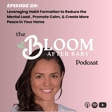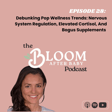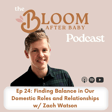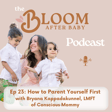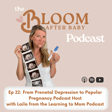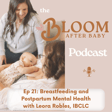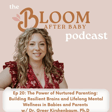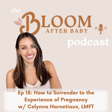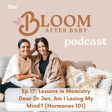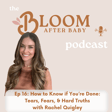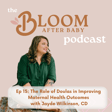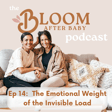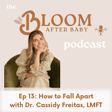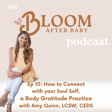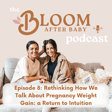
19. Honor your Hunger. Feel your Feelings. Eat the Carbs, with Diana Burge, RDN, CEDS
We have the delight this week of learning from Diana Burge, Registered Dietitian, a highly recognized and respected expert in sports nutrition, diabetes, disordered eating, and womens hormonal health. Diana has a wealth of knowledge when it comes to food science, mental health, and what our bodies are going through during pregnancy and postpartum.
In this episode, Diana schools us on the real science behind the changes during postpartum with hunger, fullness, metabolism, cravings and nutritional needs for the best energy and mood restoration.
A few nuggets you will learn in this episode:
- Why you are SO GD HUNGRY --- and what to do about it.
- What you can and can’t control in parenting AND in weight management.
- The only natural way that our body releases serotonin (aka mood stabilizer).
- Why sugar and carbs are not evil.
- 3 main reasons we develop a complicated relationship with food.
- What “diet deprivation backlash” means.
- Thermogenics of eating and why your metabolism is like a fireplace!
- Why the term “clean eating” is harmful, and mis-informed.
- Why we start losing our connection with our bodies around age 3 years old.
- WHY you gain the weight you gain in pregnancy.
- How nutritional is key for your holistic mind-body recovery in postpartum.
- What to expect your metabolism and hunger to do during pregnancy and postpartum.
- Why you shouldn’t be afraid of your hunger and cravings.
- How to eat if you are at risk for or diagnosed with gestational diabetes.
- Why ignoring your natural hunger is going to have the opposite of your desired effect.
- How you can support your child’s developing relationship with food and their body image.
- What low-carb fad diets have to do with depression statistics.
May this convo nourish your soul, and give you permission to nourish your body, too.
xoxo + PERMISSION TO DITCH BOUNCE-BACK CULTURE
INTUITIVE (MINDFUL) EATING PRINCIPLES
Evidence-Based Studies on Intuitive Eating and Health at Every Size
A BIT FRAZZLED EPISODE 8 - Rethinking the way we talk about weight gain in pregnancy + Rachel’s story of being body shamed by an OB (major yikes)
You can learn more about Rachel's California-based group therapy practice and how you can work with her at www.racheldaggettlmft.com or on instagram @rachelscouch
Find and follow us @bloomafterbaby on instagram!
*Please note that this podcast is intended for educational purposes only, and is not a substitute for seeking individualized care from a mental health or medical professional"
Learn more about us and access all of our courses, coaching services, and free resources at bloomafterbaby.com
